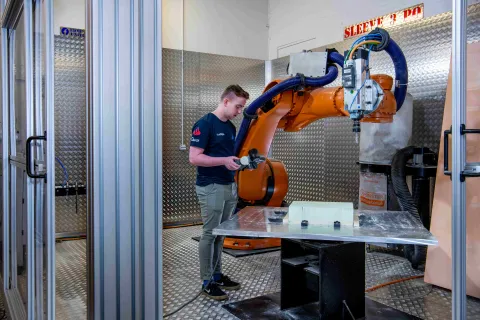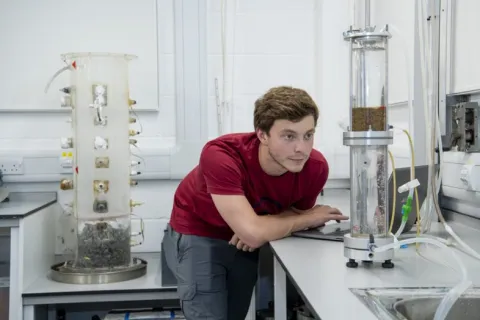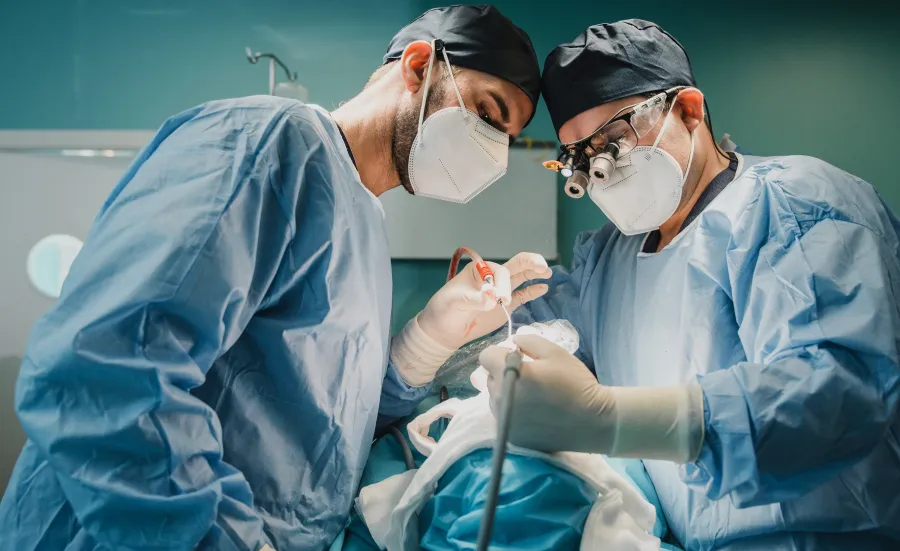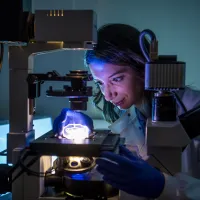Facilities

Engineering design studios and workshops


Medical Technology, Innovation and Design (MSc) starting September 2025 for 1 year
Gain the skills and knowledge to solve the world’s biggest medical challenges with our MSc Medical Technology, Innovation and Design course.
This 1-year interdisciplinary, project-based course brings together students from a variety of backgrounds to design new medical technologies based directly on clinical problems. Collaboration, innovation and entrepreneurship are at the core of this course, alongside a strong understanding of global healthcare issues.
You will be based at the University Hospital Southampton and collaborate closely with colleagues at the University Science Park, working alongside the programme team, startups and medical technology entrepreneurs.
If you have a strong interest in healthcare innovation, medical devices, or improving health outcomes globally, this course will provide you with the tools to make a significant impact.
This Medical Technology, Innovation and Design course was developed in collaboration with our global partners and is the only one of its kind in the UK. It includes 2 placements, one in the UK and the other abroad, providing students with experience in a range of clinical environments. Throughout these placements, students will work with clinical experts, business mentors and entrepreneurs, all while supported by the University of Southampton academic team.
Students will also engage with investors, gaining insights into funding and strategy, while learning the core principles of commercialisation and medical regulation. This ensures they can transform innovative ideas into viable solutions that meet healthcare industry standards.
The course goes beyond conventional learning by embedding principles of responsible innovation throughout its teaching and project work. You will be encouraged to create solutions that:
The learning outcomes are aligned with the United Nations Sustainable Development Goals, including:
By the end of the course, you will have developed not only the technical and clinical skills to design medical technologies but also the ethical, cultural, and environmental awareness to make a meaningful impact in healthcare globally.
The course is designed to build your knowledge and skills in several key areas, including:
The programme focuses on blending technical and scientific knowledge with clinical awareness and entrepreneurial thinking. By engaging in hands-on projects, you will develop expertise in creating solutions that are not only functional but also considerate of wider social, environmental, and ethical implications.
We regularly review our courses to ensure and improve quality. This course may be revised as a result of this. Any revision will be balanced against the requirement that the student should receive the educational service expected. Find out why, when, and how we might make changes.
Our courses are regulated in England by the Office for Students (OfS).
The lead for this course is Carl Verschuur. Carl is a clinical scientist and academic with 30 years' experience in audiology, hearing and deafness, and is an expert in cochlear implants and other types of implantable biomedical devices. Prior to his time as course leader, he was the director of the University of Southampton auditory implant service.


This course is based at University Hospital Southampton.
This qualification is awarded by the University of Southampton.
The Course Description Document details your course overview, your course structure and how your course is taught and assessed.
To apply for this master's in Medical Technology, Innovation and Design, you’ll need a 2:1 degree in a relevant subject, such as:
We would welcome applications from individuals who are enthusiastic about the potential of Medical Technology to transform global healthcare.
The programme is also available as an intercalated degree for undergraduate medical students who have completed at least 3 years of their programme.
If English isn't your first language, you'll need to complete an International English Language Testing System (IELTS) to demonstrate your competence in English. You'll need all of the following scores as a minimum:
We accept other English language tests. Find out which English language tests we accept.
If you don’t meet the English language requirements, you can achieve the level you need by completing a pre-sessional English programme before you start your course.
If you don’t meet the academic requirements, you can complete a pre-master's programme through our partnership with OnCampus. Learn more about the programmes available.
If you don't have the exact entry requirements, but you have significant work experience in this sector we’ll assess your relevant professional experience, your subject knowledge and your aptitude for learning.
Your application will be considered on individual merit and you may be asked to attend an interview.
Please contact us if you're not sure you have the right experience or qualifications to get onto this course.
Email: enquiries@southampton.ac.uk
Tel: +44(0)23 8059 5000
The Medical Technology, Innovation and Design degree centres on 2 interdisciplinary projects that run simultaneously through the year, allowing you to apply your learning directly.
Both projects are conducted in small teams of 4 or 5 students and unfold across three distinct phases.
Alongside these projects, you will take part in 6 course modules providing you with the academic knowledge to succeed in your projects. You will also have the opportunity to complete 2 courses in Lean processes and methodology, receiving formal qualifications upon completion.
The course is structured to combine academic learning with practical application, ensuring you develop a deep understanding of healthcare systems and the challenges they face.
Want more detail? See all the modules in the course.
The modules outlined provide examples of what you can expect to learn on this degree course based on recent academic teaching. As a research-led University, we undertake a continuous review of our course to ensure quality enhancement and to manage our resources. The precise modules available to you in future years may vary depending on staff availability and research interests, new topics of study, timetabling and student demand. Find out why, when and how we might make changes.
You must study the following modules :
In this module, Global Healthcare Innovation and Design, the set of potential needs will come from the outcomes of the earlier Principles and Practice of Global healthcare for Medical Innovation module. You (and your team) will undertake a screening and p...
This module provides you with a grounding in the skills needed to scope, plan, and develop innovative new medical technologies which address real-world healthcare needs and have the realistic potential to lead to a fully developed technology. The focus wi...
This module provides a grounding in the skills needed to scope, plan, and develop innovative new medical technologies which address real-world healthcare needs and have the realistic potential to lead to a fully developed technology. Students will learn a...
Working in an entrepreneurial context requires a different set of skills to those generally required in an academic or corporate environment. There is more emphasis on being self-reliant, being a creative problem-solver and planning your own path. It is o...
Technology needs to be designed and developed responsibly to fit the demands and constraints of users, wider healthcare stakeholders, the health system, society (both now and in the future) and our planet. We need to move away from a disposable and consum...
In this module, UK Healthcare Innovation and Design, the set of potential needs will come from the outcomes of the earlier Principles and Practice of UK healthcare for Medical Innovation module. You (and your team) will undertake a screening and prioritis...
Your learning will combine scheduled contact hours, independent study, and project work. Each module will require between 300 and 900 hours of study, depending on the number of credits the module is worth. Contact hours vary by module, and detailed information is available on the course webpages.
Beyond timetabled lectures, seminars, and practical sessions, you’ll engage in independent study. This includes reading journal articles and books, conducting research, working on group or individual projects, and preparing assignments or presentations. These activities are designed to deepen your understanding and enhance your skills.
The course is delivered by a team of experienced academics and industry professionals whose expertise aligns closely with your module content. You may also be taught by postgraduate researchers with specialist knowledge, contributing to seminars, practical classes, and project supervision under the guidance of module leaders.
The course offers both formative and summative assessments to support your learning and measure your progress.
Formative assessments are developmental tasks, such as practice assignments or presentations, designed to provide feedback and help you prepare for formal assessments. They do not contribute to your final grade but are a key part of your learning process.
Summative assessments count towards your final module marks and may include written exams, essays, reports, portfolios, presentations, or projects. Some modules also include interim assessments throughout the term. Detailed assessment methods for each module can be found on the course webpages.
You will be supported by academic staff and expert mentors from clinical and business fields throughout the course.
We will allocate a personal academic tutor to you once you arrive at the University. This is normally a member of academic staff in your own or a related subject area.
Your personal academic tutor will offer one-to-one support and advice throughout your time at Southampton. They will also support you in your studies or with other issues you may have.
The employability and enterprise skills you'll gain from this course are reflected in the Southampton skills model. When you join us you'll be able to use our skills model to track, plan, and benefit your career development and progress.
Download skills overview

Choosing to do work experience is a great way to enhance your employability, build valuable networks, and evidence your potential. Learn about the different work and industry experience options at Southampton.
We are a top 20 UK university for employability (QS Graduate Employability Rankings 2022). Our Careers, Employability and Student Enterprise team will support you. This support includes:
We have a vibrant entrepreneurship culture and our dedicated start-up supporter, Futureworlds, is open to every student.
Your career ideas and graduate job opportunities may change while you're at university. So it is important to take time to regularly reflect on your goals, speak to people in industry and seek advice and up-to-date information from Careers, Employability and Student Enterprise professionals at the University.
Fees for a year's study:
If you're an international student on a full-time course, we'll ask you to pay £2,000 of your tuition fees in advance, as a deposit.
Your offer letter will tell you when this should be paid and provide full terms and conditions.
Find out about exemptions, refunds and how to pay your deposit on our tuition fees for overseas students page.
Your tuition fee covers the full cost of tuition and any exams. The fee you pay will remain the same each year from when you start studying this course. This includes if you suspend and return.
The course fees also include costs associated with attending your international placement, a 1-year UniLink bus pass to support attending your UK placement and a project budget for each team.
Find out how to pay your tuition fees.
Accommodation and living costs, such as travel and food, are not included in your tuition fees. There may also be extra costs for retake and professional exams.
Explore:
If you’re a graduate of the University of Southampton, you could be eligible for a 10% discount on your postgraduate tuition fees.
A scholarship of £3,000 is available to international students studying for a postgraduate master’s in Medicine.
Find out more about the Southampton Medicine Postgraduate International Scholarship, including eligibility and conditions.
A variety of additional funding options may be available to help you pay for your master’s study. Both from the University and other organisations.
Find out about funding you could get as an international student.
For further details of our admission process, read our step by step guide to postgraduate taught applications.
The deadline to apply for this course is Tuesday 9 September 2025, midday UK time.
We advise applying early as applications may close before the expected deadline if places are filled.
The deadline to apply for this course is Tuesday 26 August 2025, midday UK time.
We advise applying early as applications may close before the expected deadline if places are filled.
We’ll ask you to pay a £50 application assessment fee if you’re applying for a postgraduate taught course.
This is an extra one-off charge which is separate to your tuition fees and is payable per application. It covers the work and time it takes us to assess your application. You’ll be prompted to pay when you submit your application which won’t progress until you've paid.
If you're a current or former University of Southampton student, or if you’re applying for certain scholarships, you will not need to pay the fee. PGCE applications through GOV.UK and Master of Research (MRes) degree applications are also exempt. Find out if you’re exempt on our terms and conditions page.
We are looking for candidates who are highly self-motivated, passionate about developing medical technology and able to communicate ideas effectively to others.
In addition to your on-line application, we will ask you to submit a personal statement and a short video. You'll also need to submit 2 academic references.
Please include the required paperwork showing your first degree and your IELTS English language test score (if you are a non-native English speaker) with your application. Without these, your application may be delayed.
In your personal statement, you'll need to include information about:
Your personal statement will be used to assess what skill set you can bring to the course and a potential future career in medical technology.
This should be presented in the form of a vlog of no more than 3 minutes. We would like you to talk about why you are interested in the course and a career in medical technology.
Your vlog should not use any visual aids but should just consist of you talking to camera, and it should be fully comprehensible to a layperson. In this video you will need to demonstrate:
The video will be used to assess your communication style and motivation to undertake the course.
The personal statement, video and the rest of your application will be used to assess whether the programme is likely to be right for you, and to decide whether to offer you an interview.
If you are successful in the first stage of the application, we will invite you to take part in a remote video interview comprising two separate sessions undertaken in one day. Because the programme is based on intensive small-group work through the year (reflecting the nature of careers in this area), it is also vital that we assess your ability to work together in teams. The first session will be a joint online creative activity with a maximum of three other prospective students. You will need to show that you can work effectively in a small team, and that you can show potential for creative thinking under pressure. Later the same day we will undertake a short 1 to 1 video interview.
If we offer you a place, you will need to accept the offer within 30 working days. If you do not meet this deadline, we will offer your place to another applicant.
Unfortunately, due to number of applications we receive, we may not be able to give you specific feedback on your application if you are unsuccessful.
We treat and select everyone in line with our Equality and Diversity Statement.
Please contact us if you're not sure you have the right experience or qualifications to get onto this course.
Email: enquiries@southampton.ac.uk
Tel: +44(0)23 8059 5000



